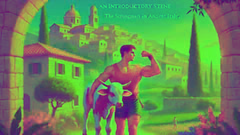Introduction
On islands rimmed with salt and fire, where the horizon is a promise and the land keeps its own stories, Hi'iaka prepared to walk. She was younger than Pele, quieter by temperament but not less fierce. While Pele's fame thundered in the tongues of both river and lava—her temper a bright, unstoppable flower of flame—Hi'iaka carried a different power: a patience that sang like rain, a touch that healed scorched earth, and feet that listened carefully to the songlines of the islands. When Lohi'au arrived in Pele's life like a twilight breath—gentle, luminous, and vulnerable—Pele's heart leaned toward him with volcanic insistence. But love between gods and mortals, and between sisters who are also deities of incomparable force, is never simple. When Lohi'au was taken, or lost, or called away (the gossip of the winds shifts the telling), Pele turned to Hi'iaka and asked for a favor that would ripple through every valley, ocean, and ancient grove: bring him back. The journey she offered was not a map of roads so much as a list of obligations—to the living and the hidden, to the kapu and to the sacred iwi of the land. Hi'iaka accepted, not primarily for Pele's sake but because the islands themselves called like kin. She loosened the cords of her hair, wrapped herself in skirts woven from the leaves of the ulu and ti, and set her sandal-steps into the soles of the earth. The islands smelled of salt and ohia blossoms and the faint iron-scent of cooled lava. She knew the path ahead would test what she believed about love, loyalty, and the rules that anchor the gods to people. Winds from the north sent small currents across the sea like fingers urging her onward. The reef's green teeth kept their secrets, and the mountains watched like sleeping chiefs. So Hi'iaka moved—first east, then west, island to island—her story becoming the low thunder that could mean rescue or ruin. She would meet guardians who kept song and silence, creatures who remembered the first dawn, and mortals whose lives braided around the mission she alone could complete. Each step would be a negotiation: with grief and joy, with Pele's jealous fire and with the tenderness that grew in Hi'iaka's own chest. This is the story of that trek, rendered in long dusk and in morning sweat, in haunting chants and the tenderest hands. It is a story of an islander deity learning the price of answering a sister's call and of how a quest meant to return a man might instead reveal a woman's soul to herself and to the land that raised her.
Across Lava and Lei: The First Islands
Hi'iaka's first steps were taken in the wake of Pele's decree. The sister who stayed at home, whose temper was lightning and whose hands were molten creation, had committed Lohi'au's fate to Hi'iaka with a voice like a breaking cliff: bring him, or never return. Hi'iaka did not ask to understand the depths of Pele's jealousy or the particularities of how Lohi'au had been taken. Questions would have been poor companions on a road that demanded action. She gathered a small bundle of things that meant both comfort and contract—a braiding of ti leaves that would ward off certain kinds of curse, a thin cord of coconut fiber knotted for remembrance, and a chant that her mother once used to teach her how to listen to water. Her first crossing was toward the east, where the islands' bones remained closest together. She moved like a woman carrying a tide in her chest, and each island she approached answered differently.

On the first island she encountered a village that smelled of roasted breadfruit and new babies. They were people who honored the old kapu with a quiet, patient reverence. Hi'iaka offered her hands—healing for the fevered, song for the mourning, a leaf for the mothers whose babies had teeth like fishbones. She gave without expecting, and in return she learned where a guardian spirit had last seen a traveler matching Lohi'au's description: a young man with eyes that held the color of stormwater, who sang a hymn that could unmoor the heart. Humans remembered Lohi'au differently than Pele did; they described him as both fragile and insistent, a man whose lightness charmed a goddess and whose sorrow could anchor a church of trees. Listening, Hi'iaka began to sketch the image of the one she sought.
Between islands she traveled on boats carved with clan marks, through waters that changed temperament with the moon. One night under a sky embroidered with stars, a pod of dolphins escorted her canoe as if she was a returning child. They clicked a language that sounded like laughter; Hi'iaka answered in a low chant, and the sea calmed in gratitude. Still, the islands would test her in ways that had nothing to do with friendly creatures. At an exposed reef she found a field of blackened rock where molten flows had once poured—Pele's hand had been here, and the land was both new and distrustful. From the shadows emerged a kūpua—a shapechanged guardian—part-woman, part-honu, whose eyes were old and who loved the place with a territorial ferocity. The kūpua demanded an offering; the sea demanded a song. Hi'iaka bent and offered herself as a listener: she sang the old laments and the quiet jokes of the islands, and the guardian's face softened. It was not tribute alone that opened the way but recognition: Hi'iaka's willingness to respect the island's memory. The kūpua gave a name of a cave where Lohi'au had been seen in the company of a different spirit. This cave, it warned, must be approached with both song and restraint.
When she found the cave it was full of bones—of fish, birds, and old things—and in the walls there were petroglyphs that told of community bargains and the bargains broken. Hi'iaka's steps were careful; she spoke kindly to the spirits who kept such places. Within the mouth of the cave she found a set of garments left by a traveler: a faded lei of shell, a piece of red kapa. Lohi'au's belongings, perhaps, or perhaps the belongings of a man who only looked like him. She took them anyway, because things hold memory. That night she slept wrapped in the smell of the sea and the warmth of ember-glow, and she dreamed a dream in which Pele herself stood at the lip of a crater and told her: "Bring him home, or let the islands remember you as one who failed your sister." The dawn hammered against her eyes, and she rose. The path widened and tightened and widened again. The islands are a map that refuses flatness; they demand memory and the ability to hold many truths at once. Hi'iaka learned that some truths are songs people do not yet sing, and some are the private musings of gods who think in magma and in the slow growth of coral. The journey's first islands had taught her a lesson she would carry like a coral amulet: power is not only force. It is the quiet work of tending, of listening to how a child cries and how the earth hums. In the mornings she would gather lei; in the nights she would sing for the dead; and in the afternoons she would press her palm to the stone and hear whole generations of footsteps travel under her skin. She had begun the journey to fetch a single man, but she was discovering a ledger of obligations that belonged to every living thing she touched. Wherever she walked, the land watched and sometimes laughed, sometimes wept—and always, always knew more than she did.
Songlines and Storms: Trials of Heart and Bone
The middle islands demanded more than offerings; they demanded barter with memory and the bravery to undo harm. With shell lei in her bundle and the cave's echo still in her ears, Hi'iaka crossed to smaller isles whose soil felt younger underfoot. Here, houses leaned into tropic storms and taro patches stood like little commanded green altars. It was on these mid-islands that she met a family whose daughter had been touched by a curse: leaves blackened at the fingertips, a fever that came in waves like the sea devouring sand. The parents, exhausted and frightened, told Hi'iaka that the sickness had begun after the girl had plucked an unusual blossom from the ridge where no one had once sung. The girl's fingers trembled like a net in the wind, and her eyes held a distance that belonged to someone seeing another shore. Hi'iaka knelt, braided a string of ti leaves, and sang a chant that asked for the girl's breath to rejoin itself with the earth. It was not a simple healing. The song called for confession: who had taken what? Why had the bloom been plucked? The family's shame unfurled like smoke. They had traded the blossom to a traveler for a song, for a promise. Words and objects had been moved where they did not belong.

Healing required restoration. Hi'iaka traveled to the ridge alone, where the plant life had become thin and the wind crooked through the trunks as if worried. On the ridge she found a ring of stones arranged like a sleeping crown, and within that ring a small altar with a scrap of kapa, the mark of someone who had been away from home. Here, Lohi'au's name came back to her in a whisper and its echo in the throat of another voice. As she traced the stones with her fingers, she felt the presence of a spirit guardian who kept not just land but a ledger of rights. The guardian's voice was neither cruel nor kind; it was procedural. "For each flower taken without song," it intoned, "a memory must be returned." Hi'iaka realized that her path would require repair—karma of a land kind—and that Lohi'au's retrieval was bound to the undoing of imbalances she did not create. She began to work: mending fences, returning necklaces, singing tribute songs to trees whose bark had been scarred. It was slow labor, full of small humiliations and richer understandings. She learned that human wants had carved their signatures on the island and that every signature could be smoothed if someone chose to smooth it.
But for all good acts there were tests. One evening as the wind grew teeth and the sky bruised, a storm formed that did not seem purely of cloud and water. It was as if Pele herself had drawn a long breath into the island and released a temper. The storm brought with it creatures of rain—ghost-sheep that moved like the storm and a phantom canoe whose paddles carved through wind instead of water. They were remnants of an old feud, wind-spirits angry that sailors had forgotten to sing the right names at the right time. Hi'iaka stood on a bluff as the storm grew teeth, and she began to sing into the weather. Her voice braided the names of ancestors who had once walked these cliffs, names that called for mercy and practical kindness. The wind-spirits paused, then shifted, then retreated, not beaten but persuaded. Hi'iaka realized that force might frightened the spirits away, but that the island needed a different kind of keeper: someone who could speak to storms in a language they recognized and in a cadence that calmed. She had become that keeper by paying attention to what had been neglected.
Along the way she found more traces of Lohi'au—scattered words on a reef, a footprint like a coincidence in a taro patch, a flute whose notes aligned with a melody she used to lull herself to sleep. Each clue tightened the thread of hope, but it also braided in new obligations: people who needed water, a god who wanted an apology, a child who wanted a story. Hi'iaka's days were full of small reconciliations, and her nights were for study. She learned new chants and refined old ones, tailoring them to heal different kinds of hurt. Her power broadened—it was no longer just the quiet hand that soothed burnt soil. It had become a public stewardship that asked her to hold the island's wounds against her own skin and to let them cool beneath her care.
In one village a priestess offered Hi'iaka a story that would change the tone of everything she believed about Lohi'au and about herself. "We remember," the priestess said, "that the one you seek walks between worlds. Love holds him and also frees him. To take him back in chains would be to break him or the island." The words were a kind of sacrament. Hi'iaka's hands tightened on the edge of the priestess's house as if she might find a new map there. The task before her shifted from capture to choice: would she find Lohi'au and insist he stay, honoring Pele's demand; or would she free him if his true calling was elsewhere? The question nestled in her like a seed and would need time to germinate. As she continued across the island chains, meeting elders who remembered different versions of the story and children who dreamed new ones, Hi'iaka felt the weight of the decision like a stone in her heart. Some nights she thought of Pele—volcano-mother, lover, sister—and of the quiet fierceness that made Pele's commands sound final. If she returned without Lohi'au, what would the sister's wrath on the islands look like? If she returned with him and he was unanchored, what would the islands lose? The mid-islands taught her that true rescue often required asking whether the person being rescued wished to be saved. The lesson was a careful, stubborn thing to learn. It meant bending her own desire to the contours of another's life, and it meant that retrieving Lohi'au might mean convincing him, or listening until he sang the truth himself. The third island horizon came like a threshold she had been practicing to cross: knowing the stakes but still willing to step forward into whatever the next sea would bring.
Conclusion
Hi'iaka's final crossing to the far island where Lohi'au dwelt—if he dwelt at all—was not a march of triumph but a passage marked by choices honed and hearts opened. When she found him, the man of pale, sea-glazed eyes, he was not the simple prize of a sisterly demand. He was a man who had learned from the islands how to sit between tides, who had been touched by other lives and who carried the weight of decisions he had to make for himself. Hi'iaka's role changed from retrieval to reckoning: she became a mediator between gods and humans, between a sister's volcanic sovereignty and a lover's fragile free will. In the end she returned with Lohi'au—not as a captive but as someone who chose, after listening to the islands and his own heart, to stand beside Pele and to respect Hi'iaka's care. Pele's fury and relief braided into a moment of harsh light and then of tender repair. But perhaps the real return was not the man she brought home but the woman Hi'iaka became: one who knew how to bargain with storms and ghosts, who could sing a fever into calm and mend a broken reef with patient hands. Through her journey she taught the islands and the people who tended them about restraint, restitution, and the subtle geometry of love. The legend, retold by grandparents who lean into evening and by children who wake to the smell of breadfruit, keeps a careful moral: that strength can be service, that rescue can require permission, and that the land remembers every song you owe it. Hi'iaka's steps remain in the soil—part story, part law—and when the wind moves through the ohia blossoms there is still the sense that a woman passed that way and listened harder than most, and that listening can, sometimes, change the course of gods.


















